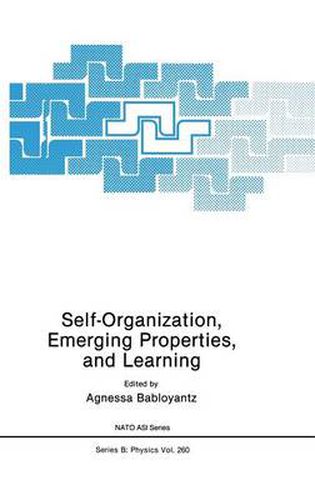Readings Newsletter
Become a Readings Member to make your shopping experience even easier.
Sign in or sign up for free!
You’re not far away from qualifying for FREE standard shipping within Australia
You’ve qualified for FREE standard shipping within Australia
The cart is loading…






This title is printed to order. This book may have been self-published. If so, we cannot guarantee the quality of the content. In the main most books will have gone through the editing process however some may not. We therefore suggest that you be aware of this before ordering this book. If in doubt check either the author or publisher’s details as we are unable to accept any returns unless they are faulty. Please contact us if you have any questions.
This volume contains the proceedings of the workshop held in March 1990 at Austin, Texas on Self-Organization, Emerging Properties and Learning. The workshop was co-sponsored by NATO Scientific Affairs Division, Solvay Institutes of Physics and Chemistry, the University of Texas at Austin and IC2 Institute at Austin. It gathered representatives from a large spectrum of scientific endeavour. The subject matter of self-organization extends over several fields such as hydrodynamics, chemistry, biology, neural networks and social sciences. Several key concepts are common to all these different disciplines. In general the self-organization processes in these fields are described in the framework of the nonlinear dynamics, which also governs the mechanisms underlying the learning processes. Because of this common language, it is expected that any progress in one area could benefit other fields, thus a beneficial cross fertilization may result. In last two decades many workshops and conferences had been organized in various specific fields dealing with self-organization and emerging properties of systems. The aim of the workshop in Austin was to bring together researchers from seemingly unrelated areas and interested in self-organization, emerg{ng properties and learning capabilities of interconnected multi-unit systems. The hope was to initiate interesting exchange and lively discussions. The expectations of the organiziers are materialized in this unusual collection of papers, which brings together in a single volume representative research from many related fields. Thus this volume gives to the reader a wider perspective over the generality and ramifications of the key concepts of self organization.
$9.00 standard shipping within Australia
FREE standard shipping within Australia for orders over $100.00
Express & International shipping calculated at checkout
Stock availability can be subject to change without notice. We recommend calling the shop or contacting our online team to check availability of low stock items. Please see our Shopping Online page for more details.
This title is printed to order. This book may have been self-published. If so, we cannot guarantee the quality of the content. In the main most books will have gone through the editing process however some may not. We therefore suggest that you be aware of this before ordering this book. If in doubt check either the author or publisher’s details as we are unable to accept any returns unless they are faulty. Please contact us if you have any questions.
This volume contains the proceedings of the workshop held in March 1990 at Austin, Texas on Self-Organization, Emerging Properties and Learning. The workshop was co-sponsored by NATO Scientific Affairs Division, Solvay Institutes of Physics and Chemistry, the University of Texas at Austin and IC2 Institute at Austin. It gathered representatives from a large spectrum of scientific endeavour. The subject matter of self-organization extends over several fields such as hydrodynamics, chemistry, biology, neural networks and social sciences. Several key concepts are common to all these different disciplines. In general the self-organization processes in these fields are described in the framework of the nonlinear dynamics, which also governs the mechanisms underlying the learning processes. Because of this common language, it is expected that any progress in one area could benefit other fields, thus a beneficial cross fertilization may result. In last two decades many workshops and conferences had been organized in various specific fields dealing with self-organization and emerging properties of systems. The aim of the workshop in Austin was to bring together researchers from seemingly unrelated areas and interested in self-organization, emerg{ng properties and learning capabilities of interconnected multi-unit systems. The hope was to initiate interesting exchange and lively discussions. The expectations of the organiziers are materialized in this unusual collection of papers, which brings together in a single volume representative research from many related fields. Thus this volume gives to the reader a wider perspective over the generality and ramifications of the key concepts of self organization.